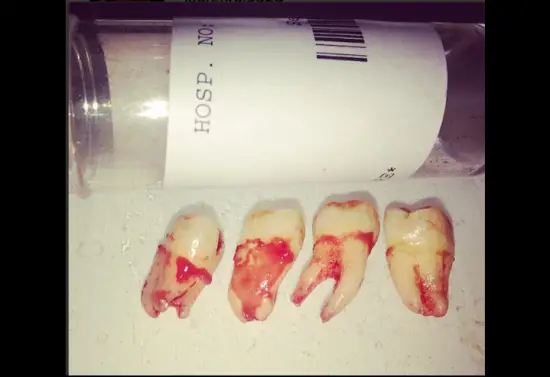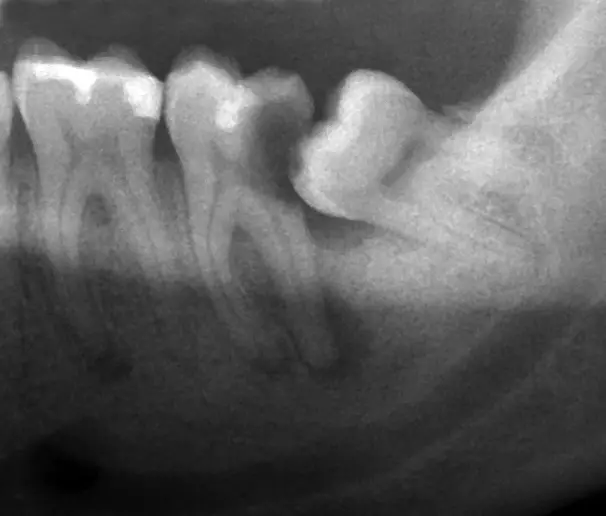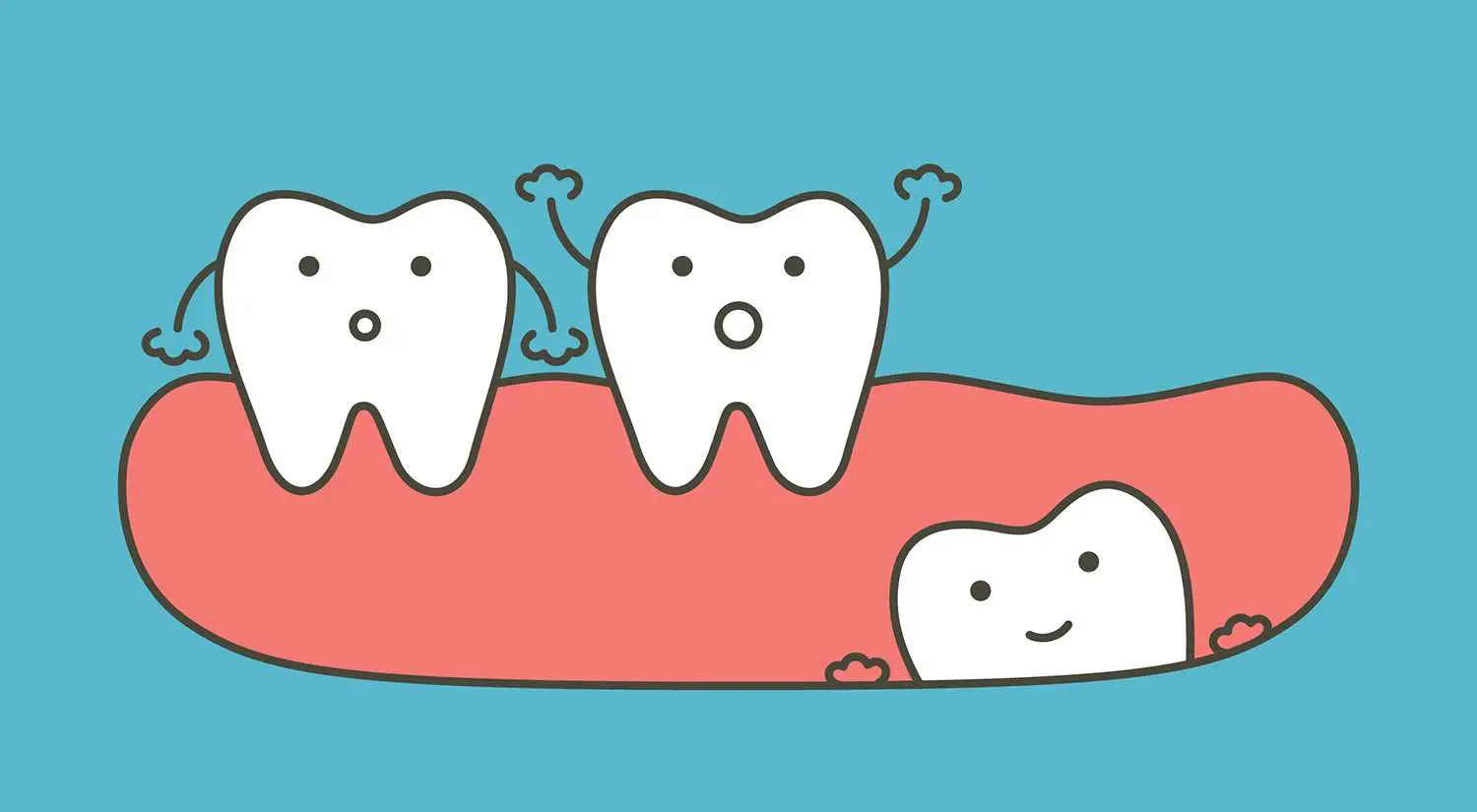During The Procedure: What To Expect
Before You Leave the House
- Go in clean.Before you go in for surgery, make sure youve flossed, brushed, and tongue-scraped since you wont be able to for a few days after surgery.
- Set up a recovery area.Before you leave the house, set up a recovery station or room at home with water, elevated pillows a sleeping station with TV and streaming DVD, music, whatever.
- Stock-up on pre-made food.Wisdom teeth recipes abound on the internet, but heres the thing: youll likely be too drugged up to be able to cook. I recommend cooking up a batch of bone broth thatll last you all week. This bone broth recipe is one of my favorites.
Under What Circumstances Can General Anaesthesia Be Used
Apart from making dental treatment in children or patients with special needs easier, GA can be used in the following situations:
- Conscious IV sedation works well for nearly all people with severe dental anxiety. But there will always be a few people for whom it doesnt work, either because you find it impossible to cooperate even when sedated and/or because you have a very high tolerance to the drugs used for IV sedation. This can be more common if youve been taking similar drugs long-term for other mental health conditions.
- A small number of people are unable to tolerate the idea of dental treatment of any sort unless they are rendered totally unconscious, regardless of the amount of pain they are suffering, and no amount of talking will make any difference. In this case, GA should be provided at least for the relief of pain and other emergency dental situations1. If its extractions that really terrify you, it may be possible to be put to sleep for the extractions and then have fillings etc. done under conscious sedation with local anaesthetic.
- General anaesthetic is rarely needed for wisdom tooth removal. But it may be recommended for especially difficult-to-remove ones. It can also be useful for certain other types of oral surgery.
When To See A Dentist
Your wisdom teeth are your last set of molars that usually appear in most individuals after the age of 12. There is a very easy way of finding out if you should make a dentist appointment for wisdom tooth removal. If youre experiencing pain from wisdom teeth, visit your doctor! If you dont know whether or not the tooth has to be removed, here are some other common situations that can further lead to surgery.
Read Also: Sleep Train Vs Mattress Firm
Get The Procedure When The Tooth Hasnt Fully Developed
Teeth usually develop starting with the crown and then proceeding to the root. This simply means that the root will not be fully developed in the tooth, so it can be removed early. This usually makes the removal easier not only for the dentist performing the operation but for you, as well. It is a very good way to reduce recovery from wisdom teeth removal.
Comfortable Extraction Of Third Molars

Wisdom teeth are the last teeth to develop and typically make an appearance around the age of 17 or during the early twenties. Also called third molars, these large teeth commonly cause a host of oral health complications because the average mouth cannot accommodate an extra set of molars. Most dental professionals recommend having wisdom teeth removed as soon as possible to prevent problems.
Dr. S. Clint Hudson regularly performs third molar extractions in Huntsville, Alabama. As a board-certified oral surgeon and physician, Dr. Hudson approaches each case from both a dental and medical perspective. This allows him to provide optimum care and produce beneficial oral health results for every patient. If youâre in need of having wisdom teeth removed or would like an evaluation of your oral health, we invite you to contact Huntsville Oral Surgery & Dental Implants to schedule an appointment.
Recommended Reading: Can You Put Sleep Number Bed On Slats
Seek Sedation Dentistry From A Qualified Practitioner
The American Dental Association requires that dental teams seek adequate training and qualifications before performing sedation dentistry. For example, a dentist would need to either use the services qualified anesthesiologist or receive training even to administer minimal sedation. As levels of sedation increase, training requirements increase as well. Even if a dentist uses an anesthesiologists service, the dentist would need to maintain up-to-date Basic Life Support training to give any level of sedation.
You Might Have Cavities Or Gum Disease
Another main reason why people undergo wisdom teeth removal is due to poor dental hygiene. The most recurrent cases involve the development of cavities and gum disease.
It is important to ensure you have good dental hygiene, as this plays a very important role in the prevention of cavities and other gum diseases.
Although there are more reasons that those noted above, the points described are the major culprits behind the need for wisdom teeth removal.
You May Like: How To Boost Metabolism While Sleeping
Wisdom Teeth Removal Aftercare
The period following a wisdom teeth removal procedure is a very important one. Several measures must be taken to ensure the beginning of a quick recovery.
Individuals who were given general anesthesia are usually taken to a recovery room where they will be monitored until they are capable of being discharged.
For those under local anesthesia during the procedure, a short stay in the dentists office is required in order to make the necessary observations.
After the hospital discharges an individual, they must go to a home that is already setup to facilitate recovery, This includes buying the right pillows for support, stocking up on food made especially for the recovery period, etc.
Here are some of the tips that can help ensure necessary care is provided after tooth extractions:
Removing The Wisdom Tooth
If the tooth hasn’t come through the gum, a small cut will be made in the gum to access it. A small piece of the bone covering the tooth may also need to be removed.
The tooth may be cut into smaller parts to make it easier to remove through the opening. There’s less need to make an incision if the tooth has broken through the gum.
You’ll feel some pressure just before the tooth is removed, as your dentist or oral surgeon needs to widen the tooth socket by rocking the tooth back and forth before taking it out.
You shouldn’t feel any pain as your wisdom teeth are removed because the area will be numb. However, if you do feel pain during the procedure, tell your dentist or oral surgeon so they can give you more anaesthetic.
How long it takes to remove the tooth will vary. Simple procedures can take a few minutes, but it can take longer than 20 minutes if it’s more complicated.
Recommended Reading: Sleep Number Credit Card Review
Anesthesia Options In Wisdom Teeth Removal
Wisdom teeth often pose a problem for people. They don’t come in at the same time, and many times, they do not grow correctly. This can lead to bite problems and infection. Gums can also become tender and swollen, and may even split around the teeth. The pain when this happens can be intolerable. When people start to experience pain due to incoming wisdom teeth, it’s wise for them to discuss the possibility of minimally invasive wisdom teeth removal with a dentist in Bronx, NY.
Are The Wisdom Teeth Impacted
Every wisdom tooth extraction is unique. Some procedures may take as little as a few minutes to get the tooth out, while other cases can take hours. If a wisdom tooth is impacted, this means that it is buried in bone. An impacted wisdom tooth can be completely bony, which means it is buried fully in bone. A partially bony wisdom tooth means that it is only buried partially. The tooth may also just have a bit of gum around it. The more bone involved in the extraction, the longer the procedure will take. Therefore, there is a higher chance of needing general anesthesia.
Your dentist should recommend complete X-rays to evaluate what needs to be done with your wisdom teeth. Dr. Sharma will evaluate the X-rays and then suggest either local or general anesthetic.
Recommended Reading: Michael Sealey Sleep Hypnosis For Anxiety Reduction & Reversal
Do They Put You Out To Remove Wisdom Teeth
In your arm, your dentist or oral surgeon uses an IV line to administer sedation anesthesia. During the procedure, you will be unconscious due to sedation anesthesia. There will be no pain and you will have a limited memory of the procedure. In addition to numbing your gums, youll receive local anesthesia.
Please Advise Me What Do Oral Surgeons Use To Put You To Sleep When They Take Out Your Wisdom Teeth

Ask U.S. doctors your own question and get educational, text answers â it’s anonymous and free!
Ask U.S. doctors your own question and get educational, text answers â it’s anonymous and free!
HealthTap doctors are based in the U.S., board certified, and available by text or video.
Recommended Reading: Sleep Number C2 Mattress Reviews
Should You Sleep With Gauze After Wisdom Teeth Removal
The purpose of gauze is to help your body clot the wound by applying light pressure against your wound. You should never sleep with gauze in your mouth because its a potential choking hazard.
Its also critical to take care not to fall asleep when youre lying down with gauze in your mouth, especially if youre taking medications that may cause drowsiness.
It can take weeks to fully heal from a wisdom tooth extraction, but taking good care of your wounds can help you minimize your recovery time. Some morning habits that may help include:
- taking any medication as prescribed by your doctor
An Overview Of The Surgery
For the surgical procedure the dentist may either give you local or general anaesthesia.
This is a state of temporary induced loss of sensation or awareness.
After that a quick overview of the surgery is that the dentist will open up the gum tissue over the tooth and take out any bone that may be covering the tooth.
He or she will separate the tissue connecting the tooth to the bone and then remove the tooth.
Sometimes the dentist will cut the tooth into smaller pieces to make it easier to remove.
It is very possible that you may need stitches afterwards.
Don’t Miss: Myoclonic Seizures In Toddlers While Sleeping
What Is Dental Sedation
Dental sedation is a method used to block pain and help patients relax during a dental procedure. For a patient to receive the best dental care possible, sedation is often necessary during wisdom teeth extractions to ensure the patient remains calm and comfortable. Knowing the patient is not experiencing pain or anxiety during an extraction also allows the dentist to work more quickly and effectively, making sedation beneficial for both the patient and dental professional.
Although the overall intention of dental sedatives is to provide increased comfort to the patient and easier functionality to the dentist, there are different levels of sedation that are offered. Several factors are taken into consideration, such as the length of the procedure and your personal pain and anxiety threshold, before you and your dentist decide which sedation level is best for you. These levels range from minimal sedation to deep sedation. Minimal sedation will always be preferred because it reduces patients anxiety and pain reception while maintaining their ability to respond to the dentists instructions or questions if needed. Deep sedation is used less often for wisdom teeth extractions and only considered after mild or moderate sedation is ruled out.
What To Expect The First Twelve Months After Surgery
- Thinning of the face, thanks to the lack of the presence of the wisdom teeth, which support the cheeks and muscles. Over time, its the lack of bone as it resorbs over many years. After many years, the muscular forces can also undergo a physical reprogramming, creating facial changes as well. Its all three of the above happening at different times, but its amazing how visible the change is right away.
- Cold sensitivity on your second molars, to things like cold drinks or ice cream. This sensitivity goes away eventually as the teeth re-calcify but could take several months. Use a fluoride toothpaste designed for sensitive teeth, like Sensodyne.
- You may feel little folds in the gumline. This is caused by the bone remodeling and flattening out as part of the healing process. This can take up to a year.
- Dont be surprised if, up to 5-10 years later, you feel a flake or sharp thing sticking out thats exfoliating bone fragments. Its your body rejecting a small flake of bone left over from the surgery. If you feel that, see your dentist and they can flick it out.
- A little bone-ache occasionally. No one knows what that is, but it is perhaps caused by the process of bone remodeling.
- You may have TMD pain upon opening, jaw clicking, or itll be hard to keep your mouth open. This is likely caused by the oral surgeon having your mouth open for too long or too wide. Ice and rest your jaw, following these TMD treatment guidelines.
Also Check: Does Sleep Number Have Sales
What To Avoid When Sleeping After Wisdom Teeth Removal
When healing from a wisdom tooth extraction, its important to take care not to dislodge the blood clots forming in your wounds, particularly in the first 24 hours. Dislodging or improper formation of a blood clot can cause a condition called dry socket. This is one of the most common complications of wisdom tooth surgery and may occur on days 3 to 5.
To minimize your risk of complications, its a good idea to avoid the following habits:
- Sleeping flat on your back. The RICE protocol of rest, ice, compression, and elevation is commonly recommended for promoting injury recovery. Use an extra pillow or two to elevate and support your head when sleeping.
- Brushing around your wounds. Its a good idea to avoid brushing around the surgery site for at least the first 24 hours to avoid dislodging your blood clot.
- Staying up late. Its important to get plenty of rest to give your body the time it needs to heal itself.
- Drinking alcohol or smoking. Alcohol and tobacco can both interfere with your bodys ability to heal itself. Its a good idea to avoid these activities for at least 24 hours after your surgery, and ideally until youre fully healed.
What Kind Of Anesthesia Will I Get
Listed from least intense to more intense, your anesthesia options are the following:
- Local anesthesia. Youre awake during the procedure and will feel some pressure but no pain. Local is administered with injections near the site of each tooth being removed. Recovery time is best with local anesthesia.
- Sedation anesthesia.: Your consciousness is suppressed, you wont feel any pain, and will have limited to no memory of the procedure. Youll also get local anesthesia to numb the site of each tooth being removed. Anesthesia is given through an IV.
- General anesthesia.: Youre completely out. Youll have no pain and no memory of the procedure. Local anesthesia is still given to numb the extraction site. This is typically only offered for the more complicated situations.
- Nitrous and local. A fourth option Im very fond of is a combination of nitrous oxide with local anesthesia. IV sedation is given most of the time for the anxiety, but nitrous is just as effective, cheaper, and takes only minutes to recover from whereas the IV sedation can take several days to wear off. If youre particularly anxious, discuss this option with your dentist. Nitrous makes even the most introverted of us very happy and bubbly and it wears off instantly.
Recommended Reading: Live And Sleep Memory Foam Mattress
How To Sleep After Wisdom Tooth Removal
If youre wondering how to sleep after wisdom tooth removal, weve got you covered.
All of us have heard the horror stories associated with the removal of wisdom teeth.
It is common knowledge that the road to recovery following a wisdom tooth extraction is a long and painful one.
So what are wisdom teeth and why exactly is the recovery process something that is feared?
Wisdom teeth are also known as the third molars.
They are the last molar teeth to develop which usually grow at the very back of the upper and lower jaw bones, one at each back corner of the mouth.
They usually grow between the age of 18 and 25.
When wisdom teeth erupt, there are two possibilities.
Either they grow out completely and nothing eventful happens or wisdom teeth are unable to completely erupt and become impacted.
When such a situation occurs, surgical intervention becomes a must.
Why?
When a wisdom tooth is impacted and tries to erupt into the mouth, the flap of gum on top of it can become infected and swollen.
This can cause it to become sore and painful. If this is not treated on time it can cause a huge infection.
Should You Be Awake Or Asleep During Your Wisdom Teeth Removal

The thought of having ones wisdom teeth removed is never on anyones priority list. Its an unfortunate reality that most of us have to go through at some point in our lives. A question that gets posed by many patients is whether its recommended to have your wisdom teeth removed while you are awake or asleep. In this article we will discuss both options, and we will let you decide what option is right for you.
You May Like: Best Mattress For Sleeping On Your Side